Qualcomm partners with Vietnam for 5G rollout
Could you share some successful cases of 5G application globally and in Vietnam?
Zeb: 5G has the capability to connect every smart device to a network, which means that everything is sending data to the cloud through private networks. Those devices will have superior connectivity and transmission speed, which means that they will be able to send lots of data, enabling digital transformation and increased productivity.
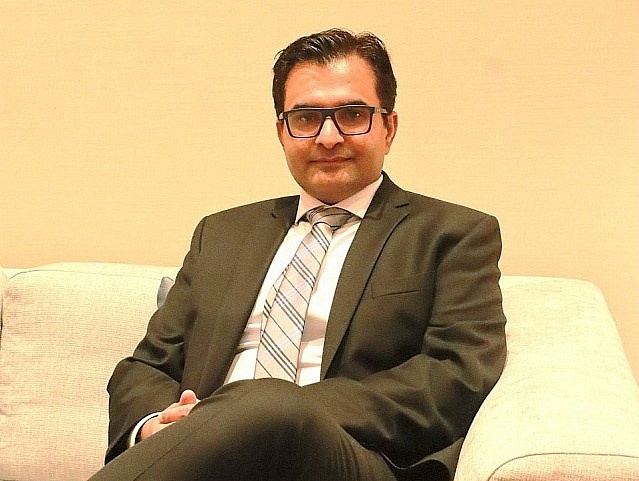 |
| Shah Zeb, senior director of Business Development at Qualcomm Technologies Inc. |
For locations where it is hard to provide home broadband, fixed wireless access could come in and close the digital divide. It is critical for providing broadband services at a similar speed to fibre-optic connections. In industrial processes and factories, 5G could play a huge role too. When using HD cameras, 5G networks could be utilised to send information with low latency, giving users the opportunity to send and receive real-time updates on the camera.
Vietnam is accelerating its digital transformation. What has Qualcomm contributed to this effort in general and in the manufacturing, banking, and finance sectors in particular?
Thieu: For 5G to happen in Vietnam, we are working with all stakeholders in the country’s mobile ecosystem. We work with the government, mostly with the Ministry of Information and Communication, and other agencies to develop the full spectrum of 5G services.
Vietnam needs a wide range of spectrum options – high-band, mid-band, and low-band – because we need to ensure that 5G will reach its full potential here. We are also helping carriers with their network design strategies and roll-out coverage and deployment. We support the Make in Vietnam campaign, so we help the country design 5G products.
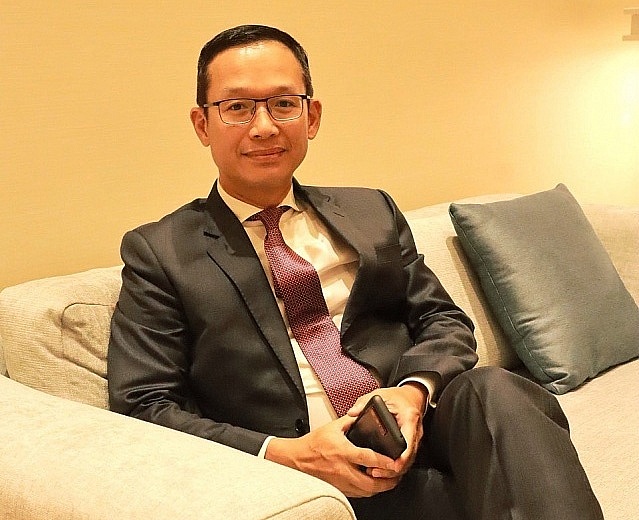 |
| Nam Thieu, general director for Vietnam, Laos, and Cambodia at Qualcomm Southeast Asia and the Pacific |
Zeb: In manufacturing and private settings, by 2025, the global economic impact of 5G will be full spectrum indoors, which means that the economic value of 5G will be created when it comes to inputting processes and automation, for example connecting machines in manufacturing segments. They connect and process all those machines in small factories and smart city environments, bringing great value overall.
Regarding the financial sector, when you enable low frequency – one of the attractive features of 5G – all transactions will be done faster and you can enable face recognition, which can help get rid of fraudulent transactions as well. It has the potential to impact different industries, not just finance.
For smart factories, you can see a lot of examples of monitoring processes remotely in the UK, the US, and Europe, where they are trying to move from Wi-Fi to 5G because 5G has better mobility. When connecting those machines and processes, reliable connectivity is needed. This is where 5G comes in.
The commercialisation of 5G in Vietnam remains behind schedule despite strong efforts from a number of stakeholders. What are the key factors that the government should focus on to accelerate the process?
Zeb: As per my understanding, those commercial deployments in Vietnam are still in their early stages of trial. In order for Vietnam to be fully ready to adopt 5G, it is crucial to have 5G options in place.
To be ready for a 5G experience, it is necessary to have a combination of high-frequency 5G bands as well as mid-band frequencies, placing them in strategic locations and with regard to what they are capable of. For example, if you place mmWave in hot zones such as shopping malls or airports, there will be a lot of congestion because there are a lot of people using it.
It aligns perfectly with Vietnam’s vision for digital transformation. If you look into what we want to achieve by connecting and modernising the IT systems, and if you follow the presentations from the minister as well, enabling communication and faster connection to 5G is critical to facilitate Vietnam in achieving its goals.
We strongly believe that when Vietnam is making the regulations from a commercialisation perspective, it should target making mmWave a part of its spectrum option process, which is scheduled for the end of this year or early next year. The pricing should be lower for mmWave as it will encourage the ecosystem to come and build a network – following what they are doing in India and Brazil.
How important is broadband and spectrum to 5G commercialisation in Vietnam and what collaborations have taken place to develop this elsewhere?
Zeb: Qualcomm is a pioneer when it comes to wireless communication. We have a long history of building standards and innovating from 2G all the way to 5G. We strongly believe in building an ecosystem with the available technology and spectrum. Our focus is on how we can be sure that our customers, businesses, and even governments are getting access to the best experience.
For 5G, we are looking at that too. We think that combining all frequency bands is the best practice so we want to build mmWave along with midland altogether. It will be the best strategy looking forward when it comes to commercialisation.
We work very closely with not only carriers but also policymakers as well to understand their positioning and their goals. For example, when it comes to governments or certain spectrum regulators, they trust Qualcomm with our history of innovation and our spectrum. So we play a part in those industries through forums to provide the most valuable inputs.
Vietnam is hoping to commercialise 5G in 2023. What sectors will benefit the most from 5G commercialisation and what are Qualcomm’s strategies in this country to benefit from this?
Zeb: Consumers will gain a huge benefit because they get more reliable connectivity from 5G on their phones from enhanced mobile broadband. Fixed wireless access is second and then manufacturing and smart factories, which is such a big push for Vietnam. All those groups can receive great benefits from 5G commercialisation.
5G is like a platform where you have all these different networks. Everything is connected, from smart factory sensors and cameras to when you look at home connectivity, you have smartphone connectivity on a public network. In other words, 5G is the network of everything with all those different devices having in-built AI – also a hugely important aspect of digital transformation. This is how you bring AI capability into those devices to make decisions instead of them just being dummy devices.
Thieu: 5G is different from 4G and older versions because those previous technologies were mostly focused on connecting people. However, 5G is about connecting everything. Shah shared a lot of new uses for 5G in his presentation today, including non-consumer uses like IoT, smart factories, education, and pharmaceuticals. 5G will transform all industries.
For Vietnam, our strategy will remain the same for next year so we can focus on those main things. We have been doing this for almost 20 years since the beginning of our operations here. Our first priority is helping Vietnam successfully deploy the 5G network.
Secondly, we have a lab here and the objective is to help Vietnam build world-class products to deliver to the world. This is the right timing because companies are moving to Vietnam and it is a win for the tech industry here.
Lastly, we want to help Vietnam build and develop digital skills and capacities. It is a big design and manufacturing hub for the region and the world, but the challenge is that Vietnam needs to provide sufficient human resources for the industry. We are fully committed to helping by rolling out the Qualcomm Vietnam Innovation Challenge. It is in its third year and gives the green light to potential entrepreneur teams to shine in Vietnam and globally to realise their ideas.
We also want to help Vietnamese universities to include the latest technology for students and teachers. We rolled out a programme with the Vietnam Post and Telecommunications Institute of Technology, sponsoring four research programmes for frontier technologies. We also fund four research projects boasting $100,000 in capital and we provide training for teachers.
Our experts come to Hanoi to provide training to the teachers so they can train their students on this technology. This programme helps Vietnam develop digital skills, and this is one of the main objectives here. That will remain to be our focus for next year and beyond.
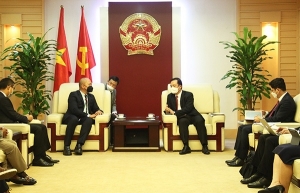 | MIC and Qualcomm intensify cooperation on 5G technology On April 12, Deputy Minister of Information and Communications Pham Duc Long had a meeting with ST Liew, vice president of Qualcomm Technologies Inc. and president of the company's business in Taiwan and Southeast Asia, and Thieu Phuong Nam, country director for Qualcomm in Vietnam, Laos, and Cambodia to discuss future cooperation on 5G and 6G technology. |
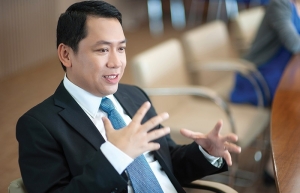 | MobiFone preparing for all benefits with 5G lift-off MobiFone, one of the biggest mobile network operators in Vietnam, is gearing up preparations for 5G commercialisation to tap into future benefits. Deputy general director Bui Son Nam talked to VIR’s Bich Thuy about 5G trials and future infrastructure plans. |
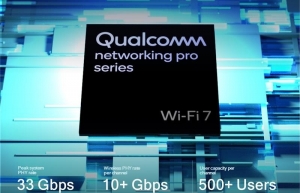 | Qualcomm debuts Wi-Fi 7 networking Pro Series Qualcomm Technologies, Inc. on May 4 announced Wi-Fi 7 Networking Pro Series, the world's most scalable commercial Wi-Fi 7 platform. |
What the stars mean:
★ Poor ★ ★ Promising ★★★ Good ★★★★ Very good ★★★★★ Exceptional
Themes: Digital Transformation
- Dassault Systèmes and Nvidia to build platform powering virtual twins
- Sci-tech sector sees January revenue growth of 23 per cent
- Advanced semiconductor testing and packaging plant to become operational in 2027
- BIM and ISO 19650 seen as key to improving project efficiency
- Viettel starts construction of semiconductor chip production plant
Related Contents
Latest News
More News
- Digital shift reshaping Vietnam’s real estate brokerages (December 31, 2025 | 18:54)
- Allen & Gledhill recognised as Outstanding M&A Advisory Firm (December 18, 2025 | 14:19)
- Inside Lego Manufacturing Vietnam (December 18, 2025 | 11:45)
- The next leap in Cloud AI (December 11, 2025 | 18:19)
- Vietnam’s telecom industry: the next stage of growth (December 11, 2025 | 18:18)
- Five tech predictions for 2026 and beyond: new era of AI (December 11, 2025 | 18:16)
- CONINCO announces new chairman and CEO (December 10, 2025 | 11:00)
- How AWS is powering the next-gen data era (December 09, 2025 | 13:14)
- Outlook in M&A solid for Singapore (December 08, 2025 | 10:31)
- Vietnamese firms are resetting their strategy for global markets (December 05, 2025 | 17:04)

 Tag:
Tag:





















 Mobile Version
Mobile Version